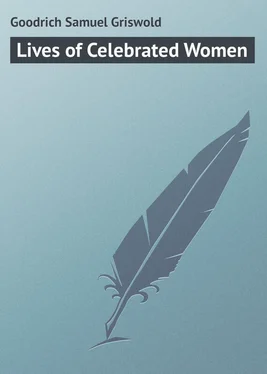Samuel Goodrich - Lives of Celebrated Women
Здесь есть возможность читать онлайн «Samuel Goodrich - Lives of Celebrated Women» — ознакомительный отрывок электронной книги совершенно бесплатно, а после прочтения отрывка купить полную версию. В некоторых случаях можно слушать аудио, скачать через торрент в формате fb2 и присутствует краткое содержание. Жанр: foreign_prose, на английском языке. Описание произведения, (предисловие) а так же отзывы посетителей доступны на портале библиотеки ЛибКат.
- Название:Lives of Celebrated Women
- Автор:
- Жанр:
- Год:неизвестен
- ISBN:нет данных
- Рейтинг книги:5 / 5. Голосов: 1
-
Избранное:Добавить в избранное
- Отзывы:
-
Ваша оценка:
- 100
- 1
- 2
- 3
- 4
- 5
Lives of Celebrated Women: краткое содержание, описание и аннотация
Предлагаем к чтению аннотацию, описание, краткое содержание или предисловие (зависит от того, что написал сам автор книги «Lives of Celebrated Women»). Если вы не нашли необходимую информацию о книге — напишите в комментариях, мы постараемся отыскать её.
Lives of Celebrated Women — читать онлайн ознакомительный отрывок
Ниже представлен текст книги, разбитый по страницам. Система сохранения места последней прочитанной страницы, позволяет с удобством читать онлайн бесплатно книгу «Lives of Celebrated Women», без необходимости каждый раз заново искать на чём Вы остановились. Поставьте закладку, и сможете в любой момент перейти на страницу, на которой закончили чтение.
Интервал:
Закладка:
Thus perished Margaret Davidson, at the early age of fifteen years and eight months. Her sister Lucretia had found in Miss Sedgwick a fitting biographer, and the memory of Margaret has been rendered more dear by the touching manner in which Irving has told her brief but wondrous story. We cannot better close our imperfect sketch, than to use the words of her biographer: “We shall not pretend to comment on these records; they need no comment, and they admit no heightening. Indeed, the farther we have proceeded with our subject, the more has the intellectual beauty and the seraphic purity of the little being we have endeavored to commemorate, broken upon us. To use one of her own exquisite expressions, she was ‘a spirit of heaven fettered by the strong affections of earth,’ and the whole of her brief sojourn here seems to have been a struggle to regain her native skies.”
MRS. ADAMS
The materials for preparing the memoirs of those American ladies whose virtues were conspicuous, and whose position in society imposed upon them great duties, and gave them an extensive influence in their day, are, in general, exceedingly scanty. Happily, the piety of a descendant has, in the present case, supplied the deficiency; and in a mode the most satisfactory. We are here not only made acquainted with the everyday life and actions as they were exhibited to the world around, but are admitted to the inmost recesses of the heart, and all its hopes and feelings are laid open to us. There are few who could bear such an exposure; but in respect to the subject of our present sketch, a nearer acquaintance and more rigid scrutiny serve only to increase our veneration, and to confirm the verdict which her contemporaries had passed upon her.
Abigail Smith, afterwards Mrs. Adams, was born on the 11th of November, 1744. She was the daughter of the Rev. William Smith, the minister of a small Congregational church in Weymouth, Massachusetts, and was descended on both sides from the genuine stock of the Pilgrims.
The cultivation of the female mind was neglected in the last century, not merely as a matter of indifference, but of positive principle; female learning was a subject of ridicule, and “female education,” as Mrs. Adams tells us, “in the best families, went no further than writing and arithmetic; in some, and rare instances, music and dancing.” But Mrs. Adams did not have an opportunity of receiving even the ordinary instruction. She was never sent to school, the delicate state of her health forbidding it. But this is hardly to be considered matter of regret, for constant intercourse with her pious and talented relations had an influence upon her character of even greater value than the learning of the schools. The lessons which made the deepest impression upon her mind were imbibed from her maternal grandmother, the wife of Colonel John Quincy. “I have not forgotten,” says Mrs. Adams, to her daughter, in 1795, “the excellent lessons which I received from my grandmother, at a very early period of life. I frequently think they made a more durable impression upon my mind than those which I received from my own parents. Whether it was owing to the happy method of mixing instruction and amusement together, or from an inflexible adherence to certain principles, the utility of which I could not but see and approve when a child, I know not; but maturer years have rendered them oracles of wisdom to me. I love and revere her memory; her lively, cheerful disposition animated all around her, while she edified all by her unaffected piety. This tribute is due to the memory of those virtues, the sweet remembrance of which will flourish, though she has long slept with her ancestors.”
But though the list of accomplishments thought essential for a young lady’s education was so scanty, it must not be supposed that the mind was left wholly uncultivated. On the contrary, few women of the present day are so well acquainted with the standard English authors, as those of the period of which we are now speaking. The influence which they had on the mind of the subject of this memoir, is apparent throughout her published correspondence, not only in the style, in the fondness for quotation, but in the love of fictitious signatures, of which the “Spectator” had set the example. The social disposition of youth renders an interchange of thoughts and feelings between those of the same age essential to their happiness. The sparse population, and comparatively small facilities for locomotion in the last century, rendered personal intercourse difficult, and a frequent interchange of letters was adopted as a substitute. This, as an exercise for the mind, is of great value, as it induces habits of reflection, and leads to precision and facility in expressing ideas.
A few of Mrs. Adams’s letters, written at an early period of her life, have been preserved, and from one of these – addressed to a married lady, several years older than herself, which will account for a gravity which is beyond her years and ordinary disposition – the following extracts are made. It is dated at Weymouth, October 5th, 1761.
“Your letter I received, and, believe me, it has not been through forgetfulness that I have not before this time returned you my sincere thanks for the kind assurance you then gave me of continued friendship. You have, I hope, pardoned my suspicions; they arose from love. What persons in their right senses would calmly, and without repining, or even inquiring into the cause, submit to lose their greatest temporal good and happiness? for thus the divine, Dr. Young, looks upon a friend, when he says, —
‘A friend is worth all hazards we can run;
Poor is the friendless master of a world;
A world in purchase for a friend is gain.’
* * * You have, like King Ahasuerus, held forth, though not a golden sceptre, yet one more valuable, – the sceptre of friendship, if I may so call it. Like Esther, I would draw nigh and touch it. Will you proceed and say, ‘What wilt thou?’ and ‘What is thy request? it shall be given thee to the half of my’ heart. Why, no, I think I will not have so dangerous a present, lest your good man should find it out and challenge me. * * * And now let me ask you, whether you do not think that many of our disappointments, and much of our unhappiness, arise from our forming false notions of things and persons. We strangely impose on ourselves; we create a fairy land of happiness. Fancy is fruitful, and promises fair, but, like the dog in the fable, we catch at a shadow, and, when we find the disappointment, we are vexed, not with ourselves, who are really the impostors, but with the poor, innocent thing or person of whom we have formed such strange ideas. * * * You bid me tell one of my sparks – I think that was the word – to bring me to see you. Why, I believe you think they are as plenty as herrings, when, alas! there is as great a scarcity of them as there is of justice, honesty, prudence, and many other virtues. I’ve no pretensions to one. Wealth, wealth is the only thing that is looked after now. ’Tis said Plato thought, if Virtue would appear to the world, all mankind would be enamored of her; but now interest governs the world, and men neglect the golden mean.”
At the age of twenty, Miss Smith became the wife of John Adams, afterwards president of the United States. Connected with this event, an anecdote is related, which, as an indication of the fashion of the day, and of the disposition of the bride’s father, is too good to be passed over. Mary, the eldest daughter of Mr. Smith, was married to Richard Cranch, an English emigrant, and, as it would appear, with the approbation of all parties; for, upon the Sabbath following, he preached to his people from the text, “And Mary hath chosen that good part, which shall not be taken from her.” But Abigail was not so fortunate; for her match, it would seem, met the disapprobation of some of her father’s parishioners, either on account of the profession of Mr. Adams, – that of the law, – which was then an obnoxious one to many people, who deemed it dishonest; or because they did not consider Mr. Adams – the son of a small farmer – a sufficiently good match for the daughter of one of the shining lights of the colony. Mr. Smith, having become aware of the feeling which existed, took notice of it in a sermon from the following text: “For John came neither eating bread nor drinking wine, and ye say, He hath a devil.”
Читать дальшеИнтервал:
Закладка:
Похожие книги на «Lives of Celebrated Women»
Представляем Вашему вниманию похожие книги на «Lives of Celebrated Women» списком для выбора. Мы отобрали схожую по названию и смыслу литературу в надежде предоставить читателям больше вариантов отыскать новые, интересные, ещё непрочитанные произведения.
Обсуждение, отзывы о книге «Lives of Celebrated Women» и просто собственные мнения читателей. Оставьте ваши комментарии, напишите, что Вы думаете о произведении, его смысле или главных героях. Укажите что конкретно понравилось, а что нет, и почему Вы так считаете.












